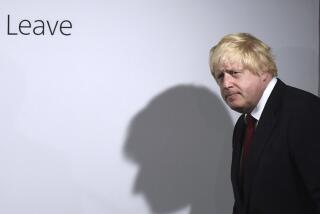Britain Retreats From Beef Battle With European Union
- Share via
FLORENCE, Italy — Britain’s monthlong diplomatic war of noncooperation with its European Union partners over a ban on the country’s beef exports ended Friday when beleaguered British Prime Minister John Major surrendered and accepted terms that met few of his initial demands.
“The prime minister has indicated our policy of noncooperation ceases as of now,” British Foreign Secretary Malcolm Rifkind told a news conference. “We are now looking forward to working again with our partners.”
While the action ended one of the worst crises in more than 30 years for the European Union, it raised questions about Major’s already shaky political position at home.
His retreat from a battle that had won him rare praise from hard-line opponents of Britain’s membership in the union, along with the backing of the country’s cattle farmers, could further erode support for his government, which clings to power with a majority of only one seat in the House of Commons.
The confrontation began March 27, with the EU’s decision to impose an export ban on British beef after Major’s government released scientific evidence suggesting that a degenerative brain disorder found in some British cattle--”mad cow disease”--could be passed to humans in the form of a deadly brain illness called Creutzfeldt-Jakob disease.
The admission, coming after years of government denials of such a link, quickly exploded into a sensitive public health issue in Britain and on the Continent. As beef consumption plummeted throughout Western Europe, the EU moved to ban British beef products, partly to contain any possible health risk but also to restore confidence among European consumers reluctant to buy beef at all.
British cattle farmers, who form a small but important element of support for Major’s Conservative Party, demanded that the government act.
Major, Rifkind and other British officials declared that they were happy with Friday’s plan, which calls for a gradual lifting of the ban, and insisted that their tough policy had won them important concessions to get the ban lifted.
In announcing his diplomatic war May 21, Major vowed that Britain would veto all EU legislation requiring the approval of all 15 member states until the other 14 agreed to a speedy lifting of the beef export ban with an agreed timetable.
The plan put together by the EU’s executive commission that Major eventually agreed to in Florence contained no precise timetable, and it is likely to be months before beef exports can resume.
In addition, Major earlier this week was forced to accept the slaughter of many more cattle than what his government had earlier reluctantly agreed to cull from existing herds where the disease existed.
That move prompted headlines containing words such as “surrender” and “hasty retreat” in newspapers normally friendly to the Conservatives.
At his news conference Friday, Rifkind hailed as an important concession the possibility of resuming exports of beef to non-EU countries immediately, provided the EU executive commission approves. But commission officials dismissed the prospect as “purely theoretical.”
“The commission is not going to approve exports to third countries before it approves them to member countries, and that will take months,” one official said.
Another official said the formula was conceived by the summit’s host, Italian Prime Minister Romano Prodi, to provide political cover for Major’s retreat.
Major’s policy of noncooperation blocked more than 100 mainly minor EU measures, ranging from a trade accord with Mexico to an initiative to designate 1997 the Year Against Racism. In the process, it generated intense anti-British sentiments in continental capitals and stiffened the EU’s resolve not to give way to pressure.
Commission President Jacques Santer labeled the British tactic “absurd and irresponsible.”
“A policy of stonewalling, whatever the reason behind it, must not be allowed to succeed,” added the European Parliament’s president, Klaus Haensch. “If it did succeed, every member state would regard this as an invitation to employ the same blackmail tactics whenever it saw fit. That would signify the end of the union.”
Major’s campaign marked the first noncooperation effort by a member state since a 1965 French boycott of meetings ordered by the late President Charles de Gaulle, who was angered by proposed agricultural policy reforms.
With Britain no longer blocking them, EU leaders Friday signed economic cooperation agreements with Chile and Uzbekistan and also approved a convention giving life to a regional law enforcement agency, Europol, established to coordinate and assist efforts to fight the growing threats of drug trafficking and other organized crime.
More to Read
Sign up for Essential California
The most important California stories and recommendations in your inbox every morning.
You may occasionally receive promotional content from the Los Angeles Times.













